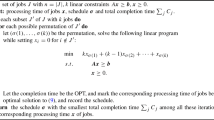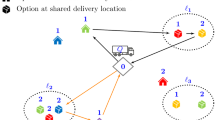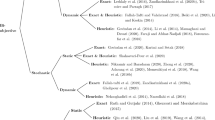Abstract
In this paper, we study the robust and stochastic versions of the two-stage min-cut and shortest path problems introduced in Dhamdhere et al. (in How to pay, come what may: approximation algorithms for demand-robust covering problems. In: FOCS, pp 367–378, 2005), and give approximation algorithms with improved approximation factors. Specifically, we give a 2-approximation for the robust min-cut problem and a 4-approximation for the stochastic version. For the two-stage shortest path problem, we give a \(3.39\)-approximation for the robust version and \(6.78\)-approximation for the stochastic version. Our results significantly improve the previous best approximation factors for the problems. In particular, we provide the first constant-factor approximation for the stochastic min-cut problem. Our algorithms are based on a guess and prune strategy that crucially exploits the nature of the robust and stochastic objective. In particular, we guess the worst-case second stage cost and based on the guess, select a subset of costly scenarios for the first-stage solution to address. The second-stage solution for any scenario is simply the min-cut (or shortest path) problem in the residual graph. The key contribution is to show that there is a near-optimal first-stage solution that completely satisfies the subset of costly scenarios that are selected by our procedure. While the guess and prune strategy is not directly applicable for the stochastic versions, we show that using a novel LP formulation, we can adapt a guess and prune algorithm for the stochastic versions. Our algorithms based on the guess and prune strategy provide insights about the applicability of this approach for more general robust and stochastic versions of combinatorial problems.




Similar content being viewed by others
References
Agrawal, A., Klein, P., Ravi, R.: When trees collide: an approximation algorithm for the generalized Steiner problem on networks. SIAM J. Comput. 24(3), 440–456 (1995)
Ben-Tal, A., El Ghaoui, L., Nemirovski, A.: Robust optimization. Princeton University Press, Princeton (2009)
Bertsimas, D., Brown, D.B., Caramanis, C.: Theory and applications of robust optimization. SIAM Rev. 53(3), 464–501 (2011)
Byrka, J., Grandoni, F., Rothvoß, T., Sanità, L.: Steiner tree approximation via iterative randomized rounding. JACM 60(1), 6 (2013)
Charikar, M., Chekuri, C., Pál., M.: Sampling bounds for stochastic optimization. In: Approximation, Randomization and Combinatorial Optimization. Algorithms and Techniques, pp. 610–610 (2005)
Dhamdhere, K., Goyal, V., Ravi, R., Singh, M.: How to pay, come what may: approximation algorithms for demand-robust covering problems. In: FOCS, pp. 367–378 (2005)
Feige, U., Jain, K., Mahdian, M., Mirrokni, V.: Robust combinatorial optimization with exponential scenarios, pp. 439–453. In: Integer Programming and Combinatorial Optimization (2007)
Goemans, M.X., Williamson, D.P.: A general approximation technique for constrained forest problems. SIAM J. Comput. 24(2), 296–317 (1995)
Goldberg, A.V., Tarjan, R.E.: A new approach to the maximum-flow problem. JACM 35(4), 921–940 (1988)
Golovin, D., Goyal, V., Ravi, R.: Pay today for a rainy day: Improved approximations for demand-robust min-cut and shortest path problems. In: STACS, pp. 206–217 (2006)
Gomory, R.E., Hu, T.C.: Multi-terminal network flows. J. Soc. Ind. Appl. Math. 9(4), 551–570 (1961)
Gupta, A., Pál, M., Ravi, R., Sinha, A.: Boosted sampling: approximation algorithms for stochastic optimization. In: STOC, pp. 417–426 (2004)
Gupta, A., Nagarajan, V., Ravi, R.: Thresholded covering algorithms for robust and max-min optimization, pp. 262–274. Automata, Languages and Programming (2010)
Immorlica, N., Karger, D., Minkoff, M., Mirrokni, V.: On the costs and benefits of procrastination: approximation algorithms for stochastic combinatorial optimization problems. In: SODA, pp. 684–693 (2004)
Infanger, G.: Planning under uncertainty: solving large-scale stochastic linear programs. Boyd & Fraser (1994)
Kall, P., Wallace, S.W.: Stochastic Programming. Wiley, New York (1994)
Khandekar, R., Kortsarz, G., Mirrokni, V.S., Salavatipour, M.R.: Two-stage robust network design with exponential scenarios. Algorithmica 65(2), 391–408 (2013)
Korte, B.H., Vygen, J.: Combinatorial Optimization: Theory and Algorithms. Algorithms and Combinatorics, vol. 21. Springer, Berlin (2008)
Prékopa, A.: Stochastic Programming. Kluwer, Dordrecht (1995)
Ravi, R., Sinha, A.: Hedging uncertainty: approximation algorithms for stochastic optimization problems. Math. Program. 108(1), 97–114 (2006)
Shapiro, A.: Stochastic programming approach to optimization under uncertainty. Math. Program. Ser. B 112(1), 183–220 (2008)
Shapiro, A., Dentcheva, D., Ruszczyński, A.: Lectures on stochastic programming: modeling and theory. Society for Industrial and Applied Mathematics (2009)
Shmoys, D.B., Swamy, C.: Stochastic optimization is (almost) as easy as deterministic optimization. In: Foundations of Computer Science, 2004. Proceedings of 45th Annual IEEE Symposium on, pp. 228–237. IEEE (2004)
Author information
Authors and Affiliations
Corresponding author
Additional information
Part of this work was done while D. Golovin was affiliated with Carnegie Mellon University and supported by NSF Grants CCR-0122581 and IIS-0121678, and M. Sysikaksi was affiliated with University of Helsinki and supported by research funds of the university. V. Goyal is supported by NSF grant CMMI-120116 and Google Faculty Award. R. Ravi is supported by NSF grants CCF-1218382 and CCF-1143998. V. Polishchuk is supported by the Academy of Finland Grant 138520.
Rights and permissions
About this article
Cite this article
Golovin, D., Goyal, V., Polishchuk, V. et al. Improved approximations for two-stage min-cut and shortest path problems under uncertainty. Math. Program. 149, 167–194 (2015). https://doi.org/10.1007/s10107-013-0742-0
Received:
Accepted:
Published:
Issue Date:
DOI: https://doi.org/10.1007/s10107-013-0742-0




